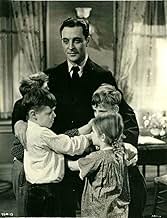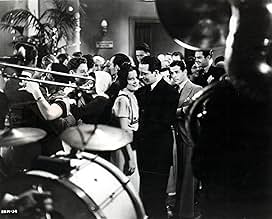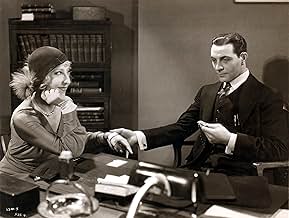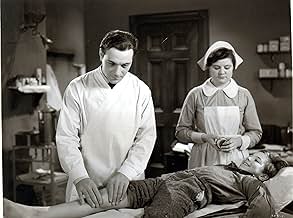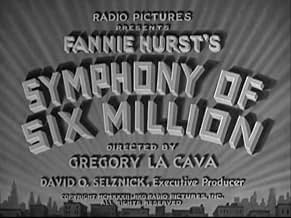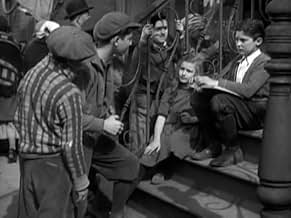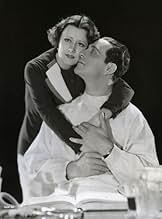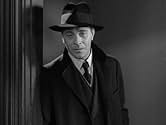IMDb RATING
6.1/10
476
YOUR RATING
A boy grows up to become a successful doctor at the expense of family relationships.A boy grows up to become a successful doctor at the expense of family relationships.A boy grows up to become a successful doctor at the expense of family relationships.
- Awards
- 2 wins total
Maurice Black
- Felix's Patient
- (uncredited)
Jesse De Vorska
- Mr. Horowitz - Hospital Patient
- (uncredited)
Harold Goodwin
- Intern at Hospital
- (uncredited)
Dorothy Gray
- Jessica - as a Girl
- (uncredited)
Julia Griffith
- Guest at Redemption Ceremony
- (uncredited)
Harry Holman
- Mr. Holman - Hospital Patient
- (uncredited)
Featured reviews
I have to say I expected more from this early thirties' Gregory La Cava Photoplay, especially since one of my favourite actresses, Irene Dunne, starred in it, but she had little time on screen (IMHO) and her role as a crippled girl, is pretty shallow, she had not yet blossomed into the great actress of "Theodora Goes Wild", "Love Affair" or "The Awful Truth".
This weepie (based on a Fannie Hurst novel, the same author who gave us "Back Street", "Imitation of Life", etc.) tells the story of a family of German immigrants, who lives in a poor Jewish ghetto in New York. Thanks to the profession of one of the sons, who grows to be a successful doctor (Ricardo Cortez), they find much better "horizons".
Ricardo Cortez, who has a Latin name but who was really born in Hungary, of Jewish background, does a fine job in the leading role, suffering a lot through the movie, 'cos he sacrifices his ideals for his family's sake. His parents are skillfully played by Anna Appel and Gregory Ratoff, who bring much truth to their interpretations.
I have to say that I enjoyed more the first part of the film which shows the life of this family when their sons were kids; there's a lot of "real" truth in the depiction of their lives, when they grow-up the film becomes more of a routine-soap opera.
Anyhow, I had never seen Ricardo Cortez in such a role, 'cos I was used to see him portraying continental men of the world or gangster-types, and as I stated before, he does a good job. Irene Dunne is less than half of what she had yet to achieve (in acting talent & beauty-I prefer her with longer hair).
No Pre-Codes aspects here, although it was released in 1932. Anyway, 1930's fans will have to see it.
This weepie (based on a Fannie Hurst novel, the same author who gave us "Back Street", "Imitation of Life", etc.) tells the story of a family of German immigrants, who lives in a poor Jewish ghetto in New York. Thanks to the profession of one of the sons, who grows to be a successful doctor (Ricardo Cortez), they find much better "horizons".
Ricardo Cortez, who has a Latin name but who was really born in Hungary, of Jewish background, does a fine job in the leading role, suffering a lot through the movie, 'cos he sacrifices his ideals for his family's sake. His parents are skillfully played by Anna Appel and Gregory Ratoff, who bring much truth to their interpretations.
I have to say that I enjoyed more the first part of the film which shows the life of this family when their sons were kids; there's a lot of "real" truth in the depiction of their lives, when they grow-up the film becomes more of a routine-soap opera.
Anyhow, I had never seen Ricardo Cortez in such a role, 'cos I was used to see him portraying continental men of the world or gangster-types, and as I stated before, he does a good job. Irene Dunne is less than half of what she had yet to achieve (in acting talent & beauty-I prefer her with longer hair).
No Pre-Codes aspects here, although it was released in 1932. Anyway, 1930's fans will have to see it.
(There may be some Spoilers) Growing up in the Jewish ghetto on the lower East Side of Manhattan Felix Kauber, Ricardo Cortez, always wanted to help those less fortunate them himself which drove him to go into medical school and become a doctor. Working at the lower East Side Cherry Street Clinic Felix was happy helping the people in the area who couldn't afford to pay a family doctor or wait hours on end at the local hospital emergency ward for treatment which was no where up to the high standards that Felix provided for them free of charge.
Happy with his lot in life Felix's life begins to change for the worse when his greedy younger brother Magnus,Noal Maison, persuades their mom Mrs. Hanna Klauber, Anna Appal, to somewhat reluctantly tell Felix that he was throwing away his future as a high paid Park Avenue doctor, treating neurotic but very rich society women, by giving his service to people who were more or less charity cases.
It takes a while for Felix to change his lifestyle and doctors office, from downtrodden Cherry Street to rich and swanky Park Avenue, feeling rightly at first that his roots and friends that needed him most were in that poor to middle-class community. Finally taking his mom's and brothers advice Felix moves up in the world of medicine, and list of high class patients, becoming one of the foremost and respected surgeons in New York. But what he doesn't know until it's almost too late is that he traded in his humanity as well as his soul for a pot of porridge; like Esau the twin brother of Jacob traded his birthright in the bible.
Very effective and ahead of it's time early talkie about a Jewish family without the usual racial and ethnic stereotype. We even have Felix have a girlfriend the sweet and caring braille teacher Jessica, Irene Dunne, who seems to be non-Jewish, Jessica looks and acts like she's Irish, with his very Jewish parents not making a point of it which you would have expected in a very Jewish movie like "Symphony for Six Million".
Felix's father Mayer, Gregory Ratoff, as well as his mother Hanna and girlfriend Jessica become more and more distant from Filex as he becomes part of the upper crust of high society without even him realizing. When Felix wasn't able to attend to young Georgie, a boy from then ghetto, who died on the operating table that Felix finally realized that eh had gone astray; Georgie died with the words Felix on his lips. Felix got the news of Georgie's death from Jessica whom he at first, until he realized that it was her, didn't want to see her at his office because she didn't have a doctor's appointment.
Felix trying to keep his past in the Lower East Side behind him has it catch up with Felix big-time when his father Meyer suffers a stroke at a party given by Fielx's sister and her husband as well as their new born son. Filex being the only one who could remove the deadly tumor from his fathers brain suddenly freezes-up and in the ensuing operation Mayer dies on the operating table. It has to be said that Felix did the best he, or any other brain surgeon, could have but still held himself responsible for his fathers Meyer Klauber's death.
Broken in both mind and body Felix mindlessly roams the streets of New York in a haze not knowing if he'll ever be able to hold a scalpel in his hands again and goes into a deep depression where he just about gave up any hope or future from himself. It's when Felix got the word that his girlfriend Jessica is to be operated on, for the removable a spine tumor, that the old Felix came back. The attending physician Dr. Schiffen,John S. Polis, feeling that Felix is a much better surgeon then he'll ever be allows Felix to operate on Jessica. A bit rusty and out of form Felix never the less ends up saving Jessica in a miraculous spine operation thus saving both her life and redeeming his soul and his lifelong concern for the city's underprivileged.
Nowhere as corny as you would expect it to be with a solid performance by Ricardo Cortez, who's Jewish himself, as the humble and caring Jewish doctor Felix Klauber. Felix learned in the end what he always believed, until he was corrupted by a fistful of shekels. Felix learned that being a physician and surgeon is to live by the rule that he always had deeply etched in both his heart and soul and upheld until greed and high society momentary blinded him of it: "I dedicate these two hands..That the lame may walk, the halt be strong..Lifting up the needy; comforting the dying. This is my oath in the Temple of Healing".
Happy with his lot in life Felix's life begins to change for the worse when his greedy younger brother Magnus,Noal Maison, persuades their mom Mrs. Hanna Klauber, Anna Appal, to somewhat reluctantly tell Felix that he was throwing away his future as a high paid Park Avenue doctor, treating neurotic but very rich society women, by giving his service to people who were more or less charity cases.
It takes a while for Felix to change his lifestyle and doctors office, from downtrodden Cherry Street to rich and swanky Park Avenue, feeling rightly at first that his roots and friends that needed him most were in that poor to middle-class community. Finally taking his mom's and brothers advice Felix moves up in the world of medicine, and list of high class patients, becoming one of the foremost and respected surgeons in New York. But what he doesn't know until it's almost too late is that he traded in his humanity as well as his soul for a pot of porridge; like Esau the twin brother of Jacob traded his birthright in the bible.
Very effective and ahead of it's time early talkie about a Jewish family without the usual racial and ethnic stereotype. We even have Felix have a girlfriend the sweet and caring braille teacher Jessica, Irene Dunne, who seems to be non-Jewish, Jessica looks and acts like she's Irish, with his very Jewish parents not making a point of it which you would have expected in a very Jewish movie like "Symphony for Six Million".
Felix's father Mayer, Gregory Ratoff, as well as his mother Hanna and girlfriend Jessica become more and more distant from Filex as he becomes part of the upper crust of high society without even him realizing. When Felix wasn't able to attend to young Georgie, a boy from then ghetto, who died on the operating table that Felix finally realized that eh had gone astray; Georgie died with the words Felix on his lips. Felix got the news of Georgie's death from Jessica whom he at first, until he realized that it was her, didn't want to see her at his office because she didn't have a doctor's appointment.
Felix trying to keep his past in the Lower East Side behind him has it catch up with Felix big-time when his father Meyer suffers a stroke at a party given by Fielx's sister and her husband as well as their new born son. Filex being the only one who could remove the deadly tumor from his fathers brain suddenly freezes-up and in the ensuing operation Mayer dies on the operating table. It has to be said that Felix did the best he, or any other brain surgeon, could have but still held himself responsible for his fathers Meyer Klauber's death.
Broken in both mind and body Felix mindlessly roams the streets of New York in a haze not knowing if he'll ever be able to hold a scalpel in his hands again and goes into a deep depression where he just about gave up any hope or future from himself. It's when Felix got the word that his girlfriend Jessica is to be operated on, for the removable a spine tumor, that the old Felix came back. The attending physician Dr. Schiffen,John S. Polis, feeling that Felix is a much better surgeon then he'll ever be allows Felix to operate on Jessica. A bit rusty and out of form Felix never the less ends up saving Jessica in a miraculous spine operation thus saving both her life and redeeming his soul and his lifelong concern for the city's underprivileged.
Nowhere as corny as you would expect it to be with a solid performance by Ricardo Cortez, who's Jewish himself, as the humble and caring Jewish doctor Felix Klauber. Felix learned in the end what he always believed, until he was corrupted by a fistful of shekels. Felix learned that being a physician and surgeon is to live by the rule that he always had deeply etched in both his heart and soul and upheld until greed and high society momentary blinded him of it: "I dedicate these two hands..That the lame may walk, the halt be strong..Lifting up the needy; comforting the dying. This is my oath in the Temple of Healing".
The story is nice, the theme pleasant (money isn't everything), but the outstanding element is the Jewish working-class background of a non-orthodox family. Not claustrophobic like the Jazz Singer and other self-pitying films, this film has an open and sunny attitude that makes it very accessible. Excellent, warm portrayals by Gregory Ratoff and Anna Appel as the stereotypical parents.
The scenes on Manhattan's Lower East Side in the 1930s are very convincing. The Jewish family in which Ricardo Cortez is a prodigy are too. The mama, played by Anna Appel, presages Molly Goldberg: "Yoo-hoo, Mrs. Fishbein," she calls out. Everything about the milieu seems authentic. (I'm not saying a 1932 film was shot on location but the setting was lovingly recreated.) Cortez, without his Latin-lover makeup and mannerisms, is very believable. I like him always. His name here is Felix and, though he plays a more somber than usual character here, it fits: His nearly omnipresent grin can remind one of Felix the Cat.
Gregory Ratoff is excellent as the stubborn patriarch of the household.
I watched it essentially because of my enduring fondness for Irene Dunne. (Director Gregory La Cava was no slouch either. His movies, especially the early ones like this, are always worthwhile.) Dunne plays a character named Jessica. Forgive me if I'm wrong but this does not sound like a name one would have been likely to encounter in the Jewish "ghetto," as the characters keep calling the neighborhood. She plays a teacher of blind children who limps.
She has very little to do and she acquits herself well. It seems like a waste of her special talents, though, and somewhat intrusive miscasting.
Nevertheless, the movie is touching and at times amusing. It's a rarity in its (generally) direct portrayal of lower-class Jewish life at the early part of the last century.
Gregory Ratoff is excellent as the stubborn patriarch of the household.
I watched it essentially because of my enduring fondness for Irene Dunne. (Director Gregory La Cava was no slouch either. His movies, especially the early ones like this, are always worthwhile.) Dunne plays a character named Jessica. Forgive me if I'm wrong but this does not sound like a name one would have been likely to encounter in the Jewish "ghetto," as the characters keep calling the neighborhood. She plays a teacher of blind children who limps.
She has very little to do and she acquits herself well. It seems like a waste of her special talents, though, and somewhat intrusive miscasting.
Nevertheless, the movie is touching and at times amusing. It's a rarity in its (generally) direct portrayal of lower-class Jewish life at the early part of the last century.
I was intrigued with the title of Six Million having a Jewish theme and what the connection would be since the movie was made in 1932. Once watching I was riveted to the story. The actors were custom made for their parts, hearing Oyfn Pripinchik being played throughout the movie made it heartwarming and endearing. A real Yiddishe Mama, an old fashioned papa (fabric cutter) and their children all living on the Lower East Side. The theme was that one of their son's wanted to be a doctor and took up a practice in their neighborhood caring for the poor (sometimes accepting no payment or very little) because it was rewarding for him. His brother saw it as wasting his talents and wanted him to become a Park Avenue big shot to make money. He did and lost his spirit. But wait til the middle and the end to see what happens. Have a box of tissues around. You will need it. Typical Fanny Hurst style.
Did you know
- TriviaAfter David O. Selznick became RKO's head of production in late 1931, he put the melodrama L'âme du ghetto (1932) (originally titled "Night Bell" after the Fannie Hurst story it is based on) into production, overseen by Pandro S. Berman. Selznick insisted that the original screenplay be rewritten to reclaim the ethnic touches from Hurst's story. Selznick likely wanted the film to serve as a mirror on to Jewish life, both of immigrants and their assimilated children. He himself changed the name of the film (a reference to New York City's population) as it was "more dramatic and dignified" than Night Bell. He also directed RKO music department chief Max Steiner to use symphonic music for the score and to have music throughout the picture. This was innovative as "talkies" rarely had an extensive score.
- GoofsAs is often the case when showing a devout Jewish home, a menorah, the traditional candelabrum, is displayed. However, this is used only once a year, so for the rest of the year it is put away. Having it on show is like having a Christmas tree up all year round to show that the family are Christians.
- Quotes
Dr. Schifflen: My boy, there are two kinds of men in our profession. Some are gifted with the spark of genius; some of us are... just doctors.
[walks to the door and opens it, then turns back toward Felix]
Dr. Schifflen: Felix Klauber, you're more capable than I, but if you don't go through with this operation, I will.
- ConnectionsFeatured in David O. Selznick: 'Your New Producer' (1935)
Details
- Release date
- Country of origin
- Languages
- Also known as
- Symphony of Six Million
- Filming locations
- Coney Island, Brooklyn, New York City, New York, USA(amusement park)
- Production company
- See more company credits at IMDbPro
Box office
- Budget
- $270,000 (estimated)
- Runtime1 hour 34 minutes
- Color
- Aspect ratio
- 1.37 : 1
Contribute to this page
Suggest an edit or add missing content


